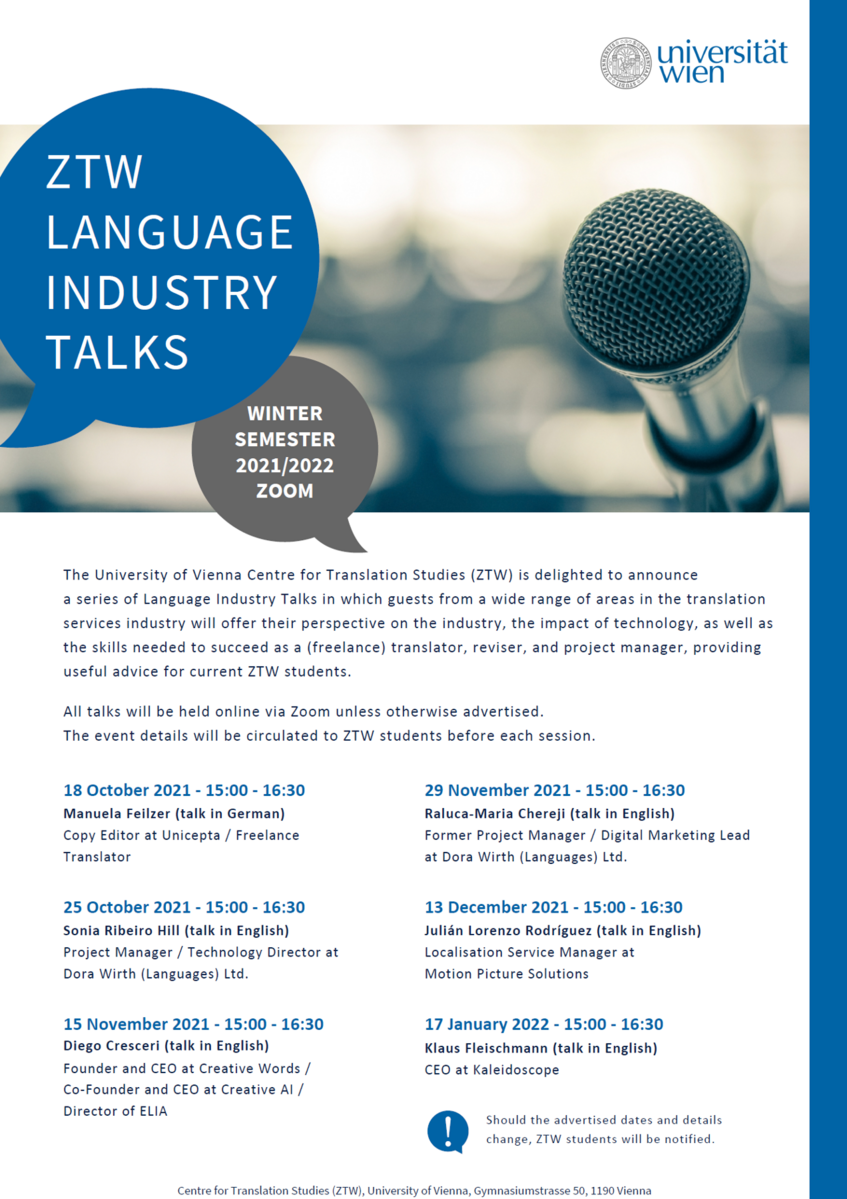ZTW Language Industry Talks
October, 2021 - January, 2022
The HAITrans (Human and Artificial Intelligence in Translation) research group at the Centre for Translation Studies, University of Vienna, looks back on its first series of Language Industry Talks that took place in the 2021/22 winter semester. In six presentations spread across the semester, language industry professionals shared their knowledge on topics ranging from translation project management and technical documentation translation to global content management and client acquisition. Our guests provided insights into career paths, challenges and motivations for students with an interest in this multi-faceted and fast-changing field of work. With a total of more than 200 attendees, the talks welcomed students from the University of Vienna, as well as the University of Graz and the University of Timișoara in Romania. The presenters answered follow-up questions from the audience, giving participants the opportunity to actively engage with industry experts. Below, we provide a quick overview of the sessions.
18 October, 2021 – Looking back on 15 years as a freelancer
Manuela Feilzer holds a diploma in Interpreting and has worked as an interpreter, terminologist, subtitler, translator and copy editor. Describing how she went from interpreting for Germany’s Federal Language Office, among other clients, to translating technical manuals and DIY books, she highlighted the most important aspects of life as a freelancer, including networking, having financial reserves, being organised and capable of realistically assessing one’s own abilities. Practical aspects such as taxes, insurance, secondary employment, and client acquisition were also discussed in detail.
25 October, 2021 – Careers in the language industry
Providing a look into the world of language service providers (LSPs), Sonia Ribeiro Hill talked about her role as Project Manager and Technology Director at Dora Wirth (Languages) Ltd., a London-based LSP specialising in the life sciences. Sonia shared how she found her way into the language industry after completing her Master’s degree in Translation Studies. She first worked as a freelance translator and interpreter before becoming a project manager at Dora Wirth, where she later took on the role of team leader in the company’s neural machine translation implementation process. Her main message to students was for them to actively pursue their individual interests and be open to learning new skills and wearing several organisational hats.
15 November, 2021 – The status of the localisation industry from the LSP view
Localisation industry entrepreneur Diego Cresceri is a Translation and Interpreting graduate, founder and CEO of LSP Creative Words, co-founder and CEO of data services company Creative AI, and was recently elected President of the European Language Industry Association (ELIA). He gave an overview of the localisation industry from the LSP perspective, mapping the market and its current trends and explaining the demand for new roles for language experts in the face of technological change. Diego provided his view on what kind of skills and qualities young professionals should bring to the table, highlighting the importance of soft skills in particular. He also offered guidance and motivation on how to find one’s niche in the market.
29 November, 2021 – What makes a good translator? A (former) project manager’s perspective
HAITrans member Raluca-Maria Chereji talked about her professional experience as a project manager, sharing her view on what makes a good translator. Raluca holds a degree in Specialised Translation and worked both as a project manager and a freelance translator before joining the HAITrans team at the University of Vienna. After describing a typical project workflow in Life Science translation, Raluca gave advice on pricing for translators, highlighted the benefits of specialisation, and shared some dos and don’ts for freelancers when working with project managers. Her main recommendations for facilitating translator-project manager collaboration were: being efficient and responsive in communication; complying with project instructions; and not letting one’s ego get in the way of the work.
13 December, 2021 – Accessibility, localisation, subtitling… Yes, you can!
The presentation by Julián Lorenzo Rodríguez focused on the film localisation industry. Julián holds a degree in Audiovisual Translation and is a Localisation Service Manager at Motion Picture Solutions, having previously worked as a subtitler, translator, reviewer and project manager. He gave an overview of his role and the localisation workflow at his company, which provides localisation services to clients, including major film studios. Julián also showed a demo of Motion Picture Solution’s film localisation platform and gave advice to students on how to break into the industry. Finally, he highlighted the importance of a positive, proactive and honest attitude when looking to find a rewarding job.
17 January, 2022 – The Smart Global Content Production Process
In the final session of the semester, University of Vienna alumnus Klaus Fleischmann gave a talk on the Smart Global Content Production Process. Klaus is a former Chair of the Globalization and Localization Association (GALA) Board, and CEO of the Kaleidoscope Group, an Austrian enterprise that provides a wide range of translation-related solutions. In the Smart Global Content Production Process, content is first created in a modern, often modular fashion, and then translated, managed and delivered. Each step of the process involves specialised tools and job roles, and requires attention to detail, technical competence and a proactive attitude. Klaus further explained how his company manages quality processes, also with regard to the use of machine translation.

